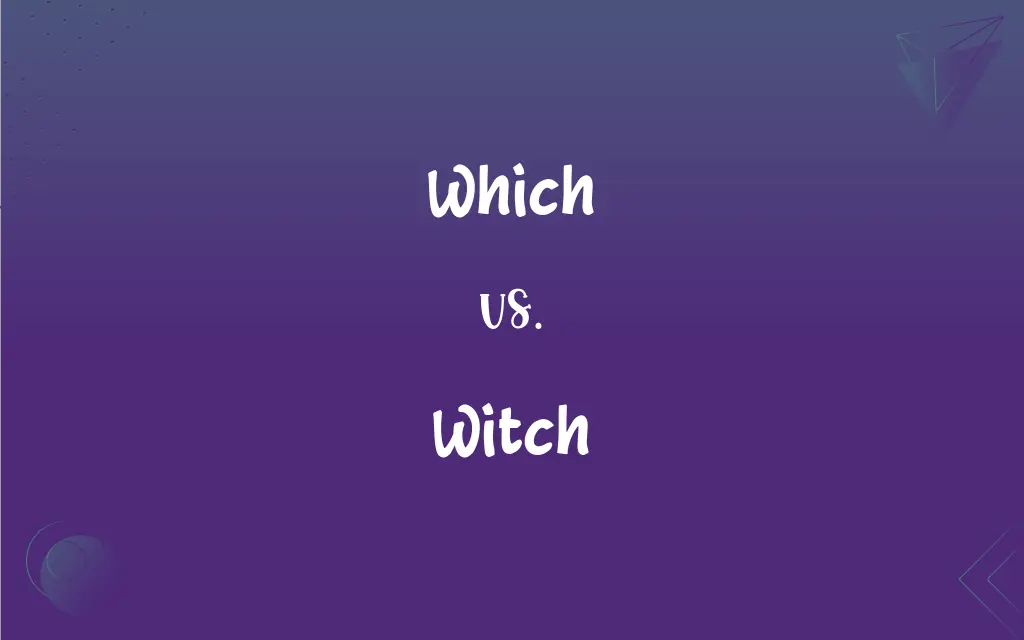Which vs. Witch: What's the Difference?
Edited by Aimie Carlson || By Harlon Moss || Updated on October 24, 2023
"Which" is a pronoun used for questioning or specifying, while "witch" refers to a person, often a woman, believed to practice magic.

Key Differences
"Which" is a word that plays a significant role in the English language, particularly in forming questions and relative clauses. On the other hand, "witch" is a noun denoting a person, typically a woman, who is thought to have magical powers or practices witchcraft.
While "which" is primarily a pronoun, it can function both interrogatively and relatively. For instance, in the question "Which book did you read?", "which" seeks specificity. Conversely, "witch" has historical and cultural connotations, often linked with folklore and tales where witches are either benevolent or malevolent magic users.
Using "which" in sentences often provides clarity, especially when distinguishing between multiple items or choices. For example, "The car, which is red, belongs to her." In contrast, the term "witch" conjures images of spellbooks, broomsticks, and potions, largely influenced by literature, movies, and historical events like the Salem witch trials.
The word "which" has no mystical or magical connotations and is purely grammatical in function. It serves to introduce additional information or to ask questions. "Witch," however, is steeped in myth, legend, and real-world events, from benevolent healers in some cultures to feared figures accused of causing harm in others.
It's important to note the completely distinct roles these two words have in the language. While "which" is versatile and common in various sentence structures, "witch" specifically denotes a character or person associated with magic, often within specific cultural narratives.
ADVERTISEMENT
Comparison Chart
Part of Speech
Pronoun
Noun
Primary Use
Forming questions and relative clauses.
Referring to a person believed to have magical powers.
Connotations
None (grammatical function).
Magic, folklore, and sometimes negative historical events.
Examples
"Which dress do you like?"
"The witch cast a spell."
In Literature/Media
Commonly used in various contexts.
Often portrayed in fantasy, horror, and historical tales.
ADVERTISEMENT
Which and Witch Definitions
Which
An interrogative pronoun asking for specification.
Which of these is yours?
Witch
Someone credited with certain mysterious or magical powers.
She's a witch when it comes to healing herbs.
Which
Referring to a previously mentioned item or items.
She bought two dresses, of which the blue one was her favorite.
Witch
A term used to describe a captivating or enchanting woman.
With her charm, she was the witch of the party.
Which
A relative pronoun introducing additional information.
The book, which I read last week, was fantastic.
Witch
A person, typically a woman, believed to practice magic.
The villagers believed she was a witch.
Which
Used to indicate alternatives.
I'm not sure which route to take.
Witch
A follower of modern witchcraft traditions or Wicca.
She identifies as a modern-day witch.
Which
Indicating a particular member of a class.
Which person told you that?
Witch
A derogatory term for an unpleasant or old woman.
The kids called the mean old lady a witch.
Which
What particular one or ones of a number of things or people
Which part of town do you mean?.
Witch
A person, especially a woman, claiming or popularly believed to possess magical powers and practice sorcery.
FAQs
Is "witch" always used in a negative context?
No, "witch" can refer to both good and bad magical practitioners or simply someone skilled in a particular area.
Can "which" introduce a clause?
Yes, it can introduce a relative clause, as in "The book which I borrowed."
How is "which" used in questions?
"Which" is used to ask for specification among a known group, e.g., "Which color do you prefer?"
Are all witches female?
No, while traditionally associated with women, men can also be referred to as witches.
Does "which" always refer to things?
No, "which" can also refer to people in formal contexts, as in "the artist which painted this."
Is "which" always followed by a noun?
No, it can precede a verb in questions like "Which do you prefer?"
Are witches always associated with broomsticks and black cats?
While popular in culture, not all traditions or portrayals of witches include these elements.
What part of speech is "which"?
"Which" is primarily a pronoun.
Is "witch" associated with a particular religion?
"Witch" can refer to practitioners of Wicca, a modern pagan, witchcraft religion.
Is a "witch" only a character in fairy tales?
While common in tales, "witch" can refer to real people, either historically or in modern witchcraft traditions.
Can "which" indicate a choice?
Yes, "which" can be used to indicate options or alternatives.
Are witches always associated with spells and potions?
Commonly, yes, but "witch" can also be metaphorical, describing someone's skill or charm.
When is "which" typically used in a sentence?
"Which" can be used at the beginning of questions or in the middle of sentences to introduce clauses.
Was the term "witch" historically linked to witch trials?
Yes, "witch" was used to accuse people, often women, of witchcraft, leading to trials and executions.
Is "which" used in formal writing?
Yes, "which" is common in both formal and informal writing.
Can "witch" be a term for someone skilled in a particular craft?
Yes, it can be used metaphorically, as in "She's a witch in the kitchen."
Does "which" always require a comma before it?
Not always, but it's common before non-restrictive clauses, e.g., "The car, which is red, is mine."
Can "witch" be a term of endearment?
It can be, especially if referring to someone's captivating qualities.
Were witches historically persecuted?
Yes, many people accused of being witches faced persecution and execution, especially during events like the Salem witch trials.
How is "which" different from "that"?
"Which" often introduces non-restrictive clauses, while "that" introduces restrictive ones.
About Author
Written by
Harlon MossHarlon is a seasoned quality moderator and accomplished content writer for Difference Wiki. An alumnus of the prestigious University of California, he earned his degree in Computer Science. Leveraging his academic background, Harlon brings a meticulous and informed perspective to his work, ensuring content accuracy and excellence.
Edited by
Aimie CarlsonAimie Carlson, holding a master's degree in English literature, is a fervent English language enthusiast. She lends her writing talents to Difference Wiki, a prominent website that specializes in comparisons, offering readers insightful analyses that both captivate and inform.































































